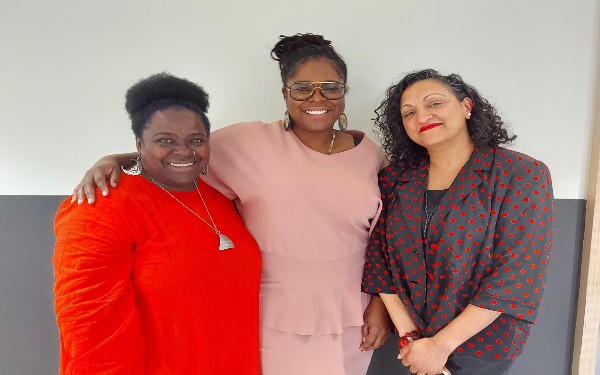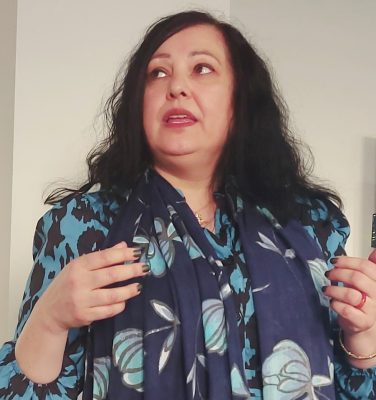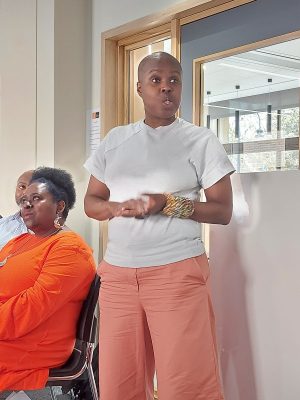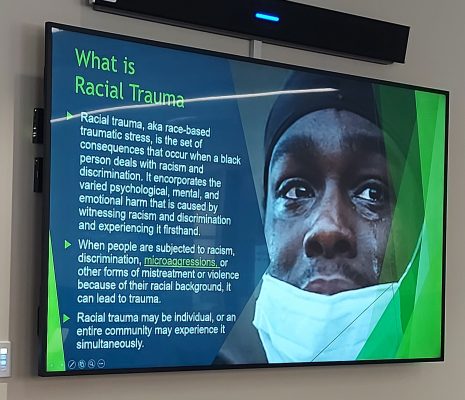
How do you rate councils’ efforts to recruit people from diverse backgrounds into social work leadership roles?
- Very poorly (46%, 125 Votes)
- Quite poorly (28%, 77 Votes)
- Very highly (14%, 39 Votes)
- Quite highly (12%, 32 Votes)
Total Voters: 273
Social work leaders must integrate anti-racism into all aspects of practice to achieve change, experts told a conference recently.
At the inaugural social worker education anti-racism network (SWEARN) conference, panelists and delegates agreed that while positive steps had been taken, through training, to get organisations talking about anti-racist practice, leadership buy-in was critical to delivering change.

Farrah Khan (credit: Community Care)
“I always think of it like a champagne fountain,” said Farrah Khan, chief officer, family help, at Leeds council, on a conference panel session. “If you pour champagne, it’s going to trickle down.
“If you focus all your training on practitioners, everybody else is going to stay the same,” said Khan, who also leads on the workforce race equality standard for Leeds children’s services.
Conference organiser Millie Kerr, who is anti-racist lead practitioner at Brighton & Hove Council, agreed: “This action is about changing the culture of an organisation and for this to happen, you need to have the full buy-in from directors. They need to show an active interest and meet with the anti-racist lead or whoever is developing the organisation’s strategy.”
Having difficult conversations
Panelists and delegates agreed that more senior leaders needed to be willing to have difficult conversations about racism in order to action change.
“Don’t exclude racism and anti-racism from any conversations,” Khan said. “It needs to be a thread through all decision-making forums. It is a culture change that requires leaders to be brave and talk about it. It is all right to say we are anti-racist but, unless we can visualise that, how can we get there?
“We would never have a children’s plan without an outcome, so how can we have an anti-racist strategy without one?” she asked participants during the conference. “We need to look at anti-racism action through a similar lens.”
She also stressed the need for leaders to make decision-making forums more inclusive.
Self-reflection
Fellow panelist Kristel Campbell, a trainee social worker with 20 years’ experience within youth justice, called on service leaders to look critically at their own biases.
“It is about looking in the mirror at ourselves, stripping away all those layers and looking critically at what we do before looking at others – and that can be uncomfortable,” she said.
“It is a challenge, but I feel like, in order to deal with discrimination of every kind, we have to start with ourselves and question why we are making certain decisions.”
Naming racist behaviour

Maria Takaendisa (credit: Community Care)
Some of that work starts by naming racist behaviour and identifying the impact, said Maria Takaendisa, a psychotherapist and trainer who works with organisations to support them to change.
She said said this had become easier to do following the global response in 2020 to George Floyd’s murder.
Social workers previously identified a tension between what organisations were saying they were doing to tackle anti-oppressive behaviour and the reality that Black and global majority practitioners* were experiencing.
“[Prior to George Floyd’s murder] social workers were telling me they were more risk averse because they were not feeling safe. They were telling me that if that if they called out racism, they were being labelled as the problem.
“Because racism is an emotional thing that we feel, it is difficult for us to evidence it. But the murder of George Floyd helped us to name it. Prior to that we were saying it does not feel right. Now, we can say that it is not psychologically safe.”
Acknowledging racial trauma
Naming the impact of racism was a thread that was revisited during one of the conference’s afternoon workshops. Led by Kerr and Shantel Thomas, anti-racism lead at the British Association of Social Workers (BASW), participants explored the physical and mental repercussions racism has on Black and global majority people.
Defined under the term ‘racial trauma’, Kerr explained that it was a “set of consequences that occurred when Black people and people from the global majority experienced racism and were subjected to discrimination – whether through microaggressions or violence”.
“It can manifest in emotions or physically and can impact people in different ways. The impact of racial trauma includes anxiety, depression, avoidant behaviour, difficulty concentrating, feelings of humiliation and hypervigilance. It can affect your appetite, impact on sleep and lead to substance and alcohol use.”
Despite the symptoms of racial trauma mirroring many of those found in post-traumatic stress disorder, Thomas explained that there were some organisations that did not recognise it as a form of trauma.

Credit: Community Care
Staff ‘feel unfairly targeted’
This could lead to misdiagnosis and the over-representation of Black and global majority people in mental health institutions. In the workplace, it resulted in people choosing to leave their jobs because they felt unfairly targeted or unsupported.
“What is your data telling you from HR?”, Kerr asked participants. “Are your Black and global majority workforce on performance and capability measures? Are they on leave and how does that compare to white staff? What have exit interviews been telling you about those that have left?”
During the session, participants were invited to discuss how they could reduce trauma and promote healing. They were invited to explore what currently happened when someone reported racism within the organisation, what was done about it and what needed to change to minimise racial trauma.
Practice examples
The conference also highlighted examples from authorities that have been seeking to embed anti-racist practice, such as Essex County Council.
Antonia Ogundayisi, who was appointed last year as the council’s first service manager, anti-racist practice, said the council had sought was to engage in challenging and uncomfortable conversations about racism with its ethnically diverse staff, enabling them to share experiences of racism in the workplace.
Karen Morgan, a senior manager in Lewisham’s children’s services and one of their anti-racist leads, said: “We’ve done a lot of work over the past two years since the killing of George Floyd, which started with giving senior leaders anti-racist training.
“It’s had a massive impact. It was self-reflective, which was brilliant, but it was also challenging for Black professionals because it was bringing up a lot of trauma around systemic and structural racism that white professionals did not realise was still happening and had been happening for many years.”
Since the training’s roll-out, the council has introduced an action, which is reviewed monthly at senior management meetings, and also runs an anti-racist network group, Morgan said.
“In order for this to be successful you have got to work together, and you need allies,” she said. “Everyone has a responsibility to be anti-racist and it has to be embedded in our culture – in everything we do and talk about and the organisations and partner agencies we work with.”
What needs to happen next?
Another speaker, Dr Tanya Moore, principal social worker, adult social care, at Essex County Council, posed a series of questions of leaders in relation to authentically embedding anti-racist practice:
- Are you ensuring that there are Black people and people from the global majority pulled into strategic meetings?
- Are you adequately supporting your Black and global majority workforce to go for job promotions?
- How diverse are your recruitment panels and conferences?
- Are you using your white privilege and influence to create spaces to keep anti-racist practice action in strategic conversations?
“We want strategic change. We don’t want to be talking anymore,” was the closing message from SWEARN chair Professor Kish Bhatti-Sinclair.
“George Floyd was a catalyst but in social work, we have been at the forefront of anti-racism work for decades. Own it. Use it and don’t forget that there’s knowledge out there – lots of psychological and sociological social work information and data that you can use. Don’t feel disempowered by any means. Look at the information, the coalitions, and the collaborative voices that you have around you and use that power.”
The SWEARN Conference was organised by Shantel Thomas, Millie Kerr and Nimal Jude, head of practice development at What Works for Early Intervention & Children’s Social Care on 25 April. It was hosted at the Royal Holloway, University of London in collaboration with BASW and WWEICSC
Other conference speakers included: Omar Mohamed, newly qualified social worker and anti-racist activist, Richard Ashiagbor, social work lecturer at South Bank University, and educator and author Rosemary Campbell-Stephens MBE, who is credited as bringing the term ‘global majority’ to prominence through her leadership work in England.
The conference explored examples of positive anti-racist practice in action; outlined ways to keep up the momentum by embedding anti-racist practice, and invited participants to pledge actions they hope to take forward into their organisations.
*Global majority is a collective term for ethnic groups that constitute approximately 85% of the global population and is considered to be an alternative to the term Black, Asian and Minority Ethnic in the UK.




 Family help: one local authority’s experience of the model
Family help: one local authority’s experience of the model  ‘I spent the first three months listening’: how supportive leadership can transform children’s services
‘I spent the first three months listening’: how supportive leadership can transform children’s services  How senior leaders in one authority maintain a culture of excellence
How senior leaders in one authority maintain a culture of excellence  How staff support ensures fantastic outcomes for children and families
How staff support ensures fantastic outcomes for children and families  Workforce Insights – showcasing a selection of the sector’s top recruiters
Workforce Insights – showcasing a selection of the sector’s top recruiters 

 Facebook
Facebook X
X LinkedIn
LinkedIn Instagram
Instagram
Social work leaders tell social work leaders to take action and wait for social work leaders to take action.
But then, what if you end up having to support a racist service user? There’s THAT barrier, too.